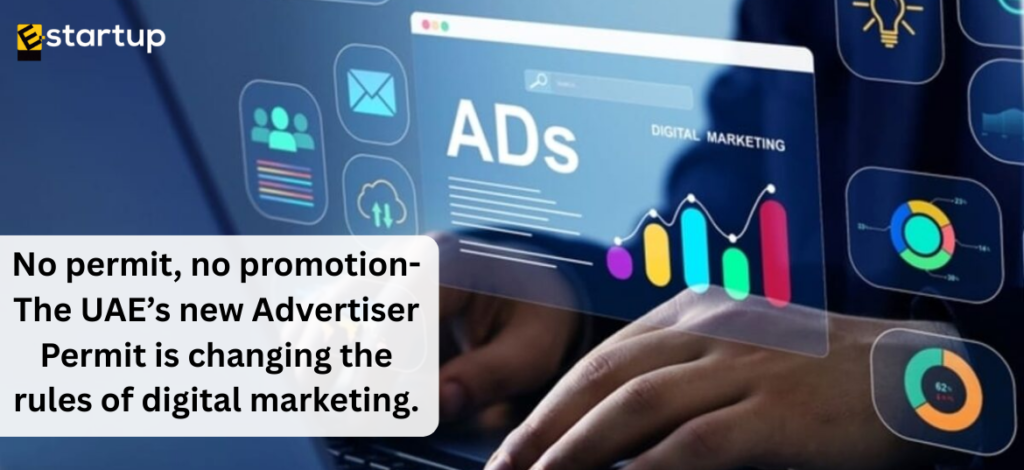Introduction
The UAE has recently launched the Advertiser Permit on July 30, 2025 a regulation aimed to regulate and professionalize online advertising. Launched by the UAE Media Council in 2025, the permit is a requirement for anyone who posts promotional or ad content on social media platforms.
Whether you are a content creator, business owner, or influencer, it’s important to know how the Advertiser Permit operates so that you can remain compliant and continue building your digital presence in the UAE.
What is the Advertiser Permit?
The Advertiser Permit is a formal permit given by the UAE Media Council that allows individuals and companies the right to publish advertising materials online. It includes paid and unpaid promotional material, whether published on Instagram, TikTok, YouTube, or elsewhere.
The primary objective of the permit is to guarantee transparency, consumer protection, and professionalism within the online advertising sector, which has developed extremely fast in recent years.
Apply for here.
Who Requires an Advertiser Permit?
- UAE residents and citizens above 18 who post advertising or promotional content.
- Influencers and content creators who participate in brand collaborations, sponsored content, or endorsements.
- Visitors and foreign influencers who want to advertise to UAE audiences, via a short-term Visitor Advertiser Permit.
Who is not required to pay?
- Those promoting their own business or personal goods.
- Under 18 creating content within sports, cultural, educational, or awareness sectors.
This balance allows small business owners and young creatives not to be curtailed, while commercial advertisers are still regulated.
Advertiser Permit Validity and Fee
- For residents and UAE citizens, the Advertiser Permit is one year valid, renewable each year.
- For tourists, the Visitor Advertiser Permit is three months valid with renewal possibilities.
- The Advertiser Permit is complimentary for UAE citizens and residents for the initial three years, providing a soft landing for influencers and small creators.
This strategy facilitates mass adoption while providing businesses and creators with time to adapt to the new regulations.
How to Apply for the Advertiser Permit
Application for the Advertiser Permit is an easy online process through the UAE Media Council’s portal.
Requirements are:
- Aged 18 years or above.
- Having no previous offense of media or advertisement law breaches.
- A trade or economic activity license for citizens and residents who are working in media or advertising services.
- For visitors, registration via a UAE-licensed advertising or talent agency.
- After approval, the advertiser must place their Advertiser Permit number on their social media pages.
Why the Advertiser Permit Matters
- Consumer confidence: Viewers understand the ads they watch are governed and trustworthy.
- Professional respect: Creators and influencers are treated as proper advertising partners.
- Market equity: The same standards apply to all advertisers, maintaining a level playing field.
- Business trust: Global brands can safely partner with UAE creators under transparent regulations.
Penalties for Advertising Without a Permit
It has been made very clear in the UAE that advertising goods or services in the absence of an Advertiser Permit will incur penalties.
Like :
- Monetary fines that increase with subsequent repetition.
- Removal of content or restrictions on accounts for non-compliant marketers.
- Suspension from ad activity until a legitimate permit is secured.
- These sanctions underscore the need for influencers and businesses to be compliant.
- Impact of the Advertiser Permit on Influencers and Businesses
The Advertiser Permit benefits influencers by giving them legitimacy and new prospects. Brands will tend to work with creators who possess a permit, indicating professionalism and compliance.
For companies, particularly SMEs and startups, the permit gives assurance that marketing campaigns shall be legal and ethical. Global influencers marketing to UAE audiences will also gain, but need to obtain a Visitor Advertiser Permit via local agencies.
Conclusion
The introduction of the Advertiser Permit is an ultimate event for the UAE digital economy. Regulating influencer marketing and online advertising, the UAE is creating a fair, trustworthy, and professional advertising environment.
For creators, influencers, and companies, the Advertiser Permit is no longer a nicety; it’s a must for growth and compliance.
As the UAE continues to emerge as a global media capital, the Advertiser Permit will be key in determining the future of digital ad in the country.
Need help with your Advertiser Permit UAE application? Book a free consultation with E-Startup today!
FAQs
- What is the UAE Advertiser Permit?
The UAE Advertiser Permit is the UAE Media Council’s permission given to individuals and companies to publish advertising and promotional materials on social media or online platforms.
- Who requires an Advertiser Permit in the UAE?
Any UAE resident, citizen, or visitor who is 18 years and above and publishes promotional or advertising materials—paid or unpaid—requires an Advertiser Permit.
- Who is exempted from the Advertiser Permit?
Exemptions are given to those advertising their own business or products, and persons under 18 years old producing educational, cultural, awareness, or sports-related material.
- How long is the UAE Advertiser Permit?
For residents and nationals of the UAE, the Advertiser Permit is one year and renewable. For foreigners, the Visitor Advertiser Permit is three months.
- How much does the Advertiser Permit cost?
The Advertiser Permit is free of cost for UAE residents and nationals for the initial three years. For tourists, it is registration agency-dependent.
- How do I apply for the Advertiser Permit?
Applications are made through the internet-based UAE Media Council portal. Candidates should be eligible and have the issued permit number visible on their social media accounts.
- What is the consequence of advertising without a permit?
Advertising without a UAE Advertiser Permit may cause monetary penalties, content removal, restrictions to an account, or suspension of advertising activity.













